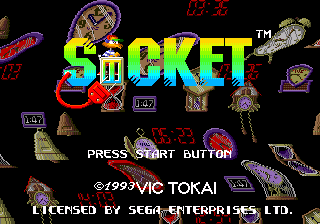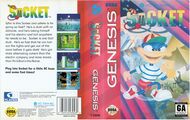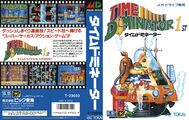Difference between revisions of "Socket"
From Sega Retro
m (Text replace - "{{Levels" to "{{sections") |
|||
| Line 69: | Line 69: | ||
| mms=68 | | mms=68 | ||
| mms_source={{num|17|page=84/85/86}} | | mms_source={{num|17|page=84/85/86}} | ||
| + | | segapro=84 | ||
| + | | segapro_source={{num|28|page=64/65}} | ||
}} | }} | ||
{{Scanbox | {{Scanbox | ||
Revision as of 15:12, 23 February 2013
This short article is in need of work. You can help Sega Retro by adding to it.
| Socket | |||||
|---|---|---|---|---|---|
| System(s): Sega Mega Drive | |||||
| Publisher: VIC Tokai | |||||
| Developer: VIC Tokai, Graphic Research (sound) | |||||
| Sound driver: GRC/later custom | |||||
| Genre: Action | |||||
| |||||
Socket, known as Time Dominator 1st (タイムドミネーター 1st) in Japan, is a platform game released for the Mega Drive in 1993. It was developed and published by VIC Tokai and stars a time travelling duck named Socket, built to "fight" in the "mascot wars" initiated by the rivalry between Super Mario and Sonic the Hedgehog. The game was released in Japan and North America, but not in Europe.
Socket borrows many elements from Sonic the Hedgehog and its sequels, causing it to be labelled as a "Sonic clone". Like Sonic there is an emphasis on speed, with the game offering several "High Speed Areas" in an attempt to woo fans of Sega's game. There are also "labyrinth" areas, which have a greater emphasis on exploration of the level. Items are collected by destroying capsules, similar to Sonic, and a time attack mode is offered.
![]() and
and ![]() make Socket jump, while
make Socket jump, while ![]() allows him to kick, acting the primary method of defense within the game. As the name may suggest, Socket requires electricity to keep going, and so must collect lightning bolts in order to stay alive. His health will otherwise deteriorate over time. Socket has a machine allowing him to travel through time, so each level is set in a different time period as well as setting.
allows him to kick, acting the primary method of defense within the game. As the name may suggest, Socket requires electricity to keep going, and so must collect lightning bolts in order to stay alive. His health will otherwise deteriorate over time. Socket has a machine allowing him to travel through time, so each level is set in a different time period as well as setting.
Socket was the subject of mixed reviews at the time of release. Sega Zone gave the game the lowest possible score on the basis that it was a Sonic clone.
Levels
Stages in Socket follow a format rarely seen in other games - they are split into three "sub-stages", each sporting a different change of pace. The first sub-stage is merely called a "High Speed Area", playing to the fast speeds of Socket. High Speed Areas have their own set of graphics and could be seen as completely independent stages, but the game classes them as part of a three-act stage. High speed areas presumably are what Socket must overcome in order to travel through time and reach his destination.
The second sub-stage, now set in a specific time period, is deemed an "Athletic Area", resembling more of what you might see in a Sonic the Hedgehog platformer. They are a more balanced mixture of running and jumping than the high speed areas.
The third and final sub-stage is called a "Labyrinth Area", and is much like the above aside from the fact that Socket needs to find a door (i.e. there is a need for exploration). Going through that door will inevitably put Socket up against a boss. Template:Sections
Manuals
Physical Scans
| Sega Retro Average | |||||||||||||||||||||||||||||||||||||||||||||||||||||||||||||||||||||
|---|---|---|---|---|---|---|---|---|---|---|---|---|---|---|---|---|---|---|---|---|---|---|---|---|---|---|---|---|---|---|---|---|---|---|---|---|---|---|---|---|---|---|---|---|---|---|---|---|---|---|---|---|---|---|---|---|---|---|---|---|---|---|---|---|---|---|---|---|---|
|
| 58 | |
|---|---|
| Based on 13 reviews | |
| Mega Drive, KR |
|---|
|
- ↑ 1700 igr dlya Sega, "" (RU; 2001-xx-xx), page 212
- ↑ Beep! MegaDrive, "October 1993" (JP; 1993-09-08), page 24
- ↑ Console Mania, "Gennaio 1994" (IT; 199x-xx-xx), page 71
- ↑ Cool Gamer, "9" (RU; 2002-10-13), page 192
- ↑ Hippon Super, "October 1993" (JP; 1993-09-03), page 41
- ↑ Mega, "February 1994" (UK; 1994-01-20), page 38
- ↑ Mega Fun, "03/94" (DE; 1994-02-23), page 106
- ↑ Mean Machines Sega, "March 1994" (UK; 1994-01-28), page 84
- ↑ Sega Power, "February 1994" (UK; 1994-01-06), page 73
- ↑ Sega Pro, "February 1994" (UK; 1993-12-30), page 64
- ↑ Sega Zone, "January 1994" (UK; 1993-12-23), page 58
- ↑ Sega Saturn Magazine, "September 1995" (JP; 1995-08-08), page 87
- ↑ Video Games, "2/94" (DE; 1994-01-26), page 50


